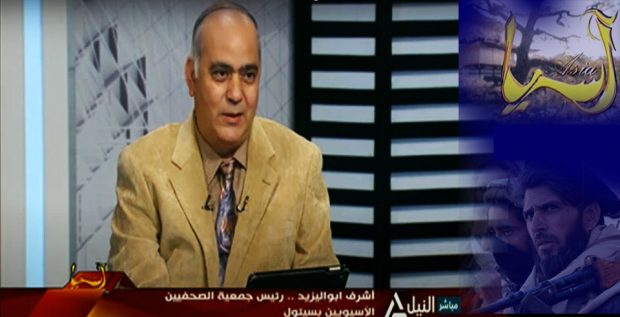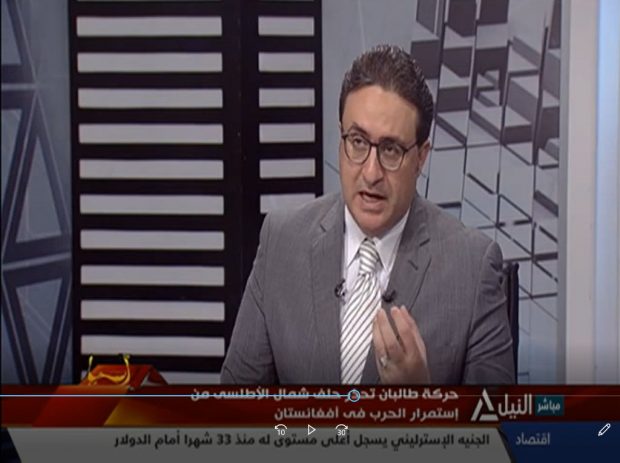Situation in Afghanistan defies solutions amid lack of genuine will, absence of sensible moves

Ashraf Aboul-Yazid during the interview about Afghanistan and the latest threat by Taliban
CAIRO: Asia Journalist Association President Ashraf Aboul-Yazid has ruled out the possibility of a real solution to the Afghanistan crisis in the near future.
“I am pessimistic. If I say there is a solution, I think I am far from the right thing because the cycle of this threat is repeated,” he said.
“There is a threat whenever it seems that there is a solution, or if we seem to have a secure future or that there is a renewal of the presence of the governmental authority in Afghanistan. It happened in 2007; it happened again in 2014, and it is happening now, even after the conclusion of an agreement in Doha last year,” Ashraf, an expert on Asian affairs, said in an interview with Tamer Hanafi for Asia program on Nile TV.
Ashraf said that the motives for the foreign presence in Afghanistan had diverged over times.
“The goal – after September 11, 2001, and the arrival of the United States into Afghanistan – was to punish those behind the terrorist attacks in the US. The goal that convinced the allies at the time was to make sure Afghanistan is not a haven for terrorists to threaten the world again,” he said.
“The participation of 50 countries, including NATO members of course, and the partners or collaborators with them, who allied with them from outside the alliance, sent more than 130,000 soldiers. Over time, these numbers decreased, and the number of participants in the alliance also went down. The main reason was that many questions started to be asked within the alliance, among the senior members of the alliance.”
Ashraf cited the example of Germany.
“When Germany entered, it wanted to participate alongside the United States, to express its support for the US, as a confidence booster. They also said that they will support the US views in this regard,” he said.
“The presence of German troops on a foreign soil has to be renewed yearly. The condition for presence of these forces is fire only in self-defense, which meant they had a limited role. In addition, Germany insisted, wanted, or chose to stay in the north as it is less dangerous than the south, so the countries in the south started asking when they will leave.”
In 2007 in Germany, 57% of the public wanted to get out of Afghanistan immediately, then this number increased after seven years to 70%, even though they were the least vulnerable, he added.
Interviewer: Where is the disagreement here regarding the views of the strategies for each country? We are talking as you said, and as you indicated at the beginning of your speech, that whenever a solution appears on the horizon, matters get complicated. Why is that?
Ashraf Aboul-Yazid attributed complications in developments in situation to changes in strategies.
“The strategy has changed, from ‘we want to eliminate the Taliban using a conventional war’, to ‘we want to develop the country, secure it, and develop its capabilities to defend itself’, which is the strategy of NATO. NATO wanted to develop from engaging on a battlefield to building and reconstructing. There were about 28 teams to rebuild the country.”
After NATO established the UN-mandated International Security Assistance Force (ISAF), there was a NATO representative with the government, meaning that he coordinated what was done every day, he said.
“These reconstruction operations required many needs that were not met by the allies. And they – perhaps – found it easier to hit with the bombs from the sky than to build on the ground. The existence of some kind of alliance between Al Qaeda in the south and the Taliban confirmed that this reconstruction is not possible. Survival for the sake of reconstruction only is not possible,” Ashraf said.
“Therefore, the Taliban’s terrorist operations intensified, and there were reactions from the alliance on the ground, which made the reconstruction policy only not viable. There had to be cohesion and fighting with the Taliban.”
Regarding the American orientation towards Afghanistan amid the signing of the peace agreement, Ashraf said that the review of the agreement is part of the reviews of everything that happened in the Trump era
“The current US President is not reviewing not only the peace agreement with the Taliban and what happened in Afghanistan, but also the American presence in other places, as well as immigration laws … These are part of a general review, but it appears that the presence of only 2,500 US troops in Afghanistan may be more vulnerable than the presence of larger forces; because when the number decreases in light of the escalating attacks on civilians, and other terrorist operations, it means that you are putting this small force at risk,” he said.
“I mean, we in Asia Journalist Association have noticed, for example, the escalation of Taliban murders of media persons, on a regular basis. Journalists returning home were stopped and killed. In two months, there were five media fatalities.”

Tamer Hanafi interviewing Ashraf Aboul-Yazid for Nile TV
When the interviewer wanted to know how the Asia Journalist Association understood the media shootings in Afghanistan, Ashraf said that AJA found that the attackers do not want a voice that was different from theirs.
“These victims insist positively that there is a peaceful solution, that there is a civil society, that there is a reconstruction, while Taliban does not want this bright outlook, or this positive voice, or the voice of the government, because you cannot now separate the government from peaceful opinion or public opinion calling for peace. The public opinion that the Alliance wants to achieve through its existence.”
Ashraf Aboul-Yazid said that Afghani President Ashraf Ghani, originally an academic specialized in religious affairs, was a President of Kabul University who had studied in the United States of America.
“I think he was the most appropriate to achieve something for his country, and during the Soviet era he was not present in the country. He went to Lebanon to study, married a Lebanese woman, traveled to the US and obtained a doctorate. He returned home and was elected Member of Parliament with a project for the poor, before being elected president in 2014. He is a model and ideal person in his vision of the country and the development of the country, so his exclusion was really unjustified.”
On whether the Joe Biden administration has the ability to change course or reach an opinion contrary to the one signed under the Trump administration, Ashraf said that issuing a decision is an easy matter, but implementing it is very difficult.
For some countries, such as Germany, there are other parties and partners whose approval is needed.
“For example, the United Kingdom considers that corruption is more evil and more harmful to the stability of the Afghani affairs than the terrorism carried out by the Taliban. Imagine you are building a pyramid, but it is a wooden pyramid that weevils eat.”
“The Afghan government receives a lot of criticism, and it says that what undermines the work of the alliance in Afghanistan is not only the Taliban attacks, but also the administration itself, which has been greatly marred by corruption, and this corruption has helped the influence and interference of Al Qaeda and its agents in Afghan affairs.”
Responding to a query about why analysts continue to link Al Qaeda to the Taliban, even though the US sits with it, Ashraf said there are different forms of Al Qaeda.
“There is the Taliban that arose in response to a long war that lasted two decades. So, these fighters want to impose their opinion by force. When you look at the history of Afghanistan, it was the country of the Aryana civilization a thousand years B.C., until the fifth century AD, then it became (in the era of Islam) Khorasan, and then it became Afghanistan, in the 19th century,” he said.
“The Taliban want to take today’s Afghanistan back to the fifth century AD, to revive that kingdom, or empire, or name, and to be under the flag that they hoist and the rules they advocate. So, you find the Hazaras, the Tajiks and the Pashtuns, and you also find those coming from Pakistan who are the Baloch. The tribal strength in which Afghanistan is formed allows the Taliban to have the ability to change and impose matters.
“I mean, you are asking here about a cultural component of this country, and this cultural component is captured by the Taliban, and I believe that its control is not without religious matters, which the current President of Afghanistan has specialized and studied.”
Ashraf stressed that the situation will not be resolved.
“The United States wanted to wipe out the Taliban and impose a Western model inside the country. The only criticism made by former President Hamid Karzai was when he said in 2014 that terrorists graduated from the well-known American Bagram base, as they arrest civilians and imprison them in Bagram, then they are brought out as terrorists who hate the state,” he said.
“This criticism made Karzai fail in the elections and Ashraf Ghani Ahmad Zai succeed. They only want an ally, and he is the one who brought up the current ally with them, with the strength they want, and I believe that they have failed in many places, and failure exists if the alliance’s desires to erase what could be an Afghan identity, as the Afghan identity is emerging from Afghanistan, and it is not necessarily the identity of the Taliban. It is a local identity.”
Ashraf said the US would not leave the region,
“The United States does not want, just as the former colonial powers did not. to leave that region, because it is a region that civilizations have passed through. Even Alexander the Great went to Afghanistan during his conquests, and reached Balkh, from which Rumi left, so you are in front of a vital region, in Central Asia, its hands are connected from China to Iran, to the Arabian Gulf, and to Pakistan. This center America does not want to get out of. America wants to stay with the least losses.”
Ashraf added that the the West reduced troops in the region to cut losses.
To the comment by the interviewer that “reducing the forces increases the losses,” Ashraf said the country leaders should explain their decisions.
“You had 20 years to change the infrastructure, you could not eliminate corruption, and you could not end the reconstruction. You could not make peace with the Taliban. The Western forces transformed the goal to develop and survive, and this did not happen.”





















































